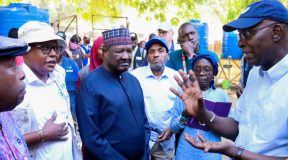We Are Developing New Approach To Visa Process To Fertilize Business Growth Between Nigeria And South Africa
OpenLife Nigeria reports that the Consul General of the Republic of South Africa Consulate in Nigeria, Dr. Bobby Moroe has assured that the consulate is developing a new model for ease of visa for Nigerians who intend to travel to South Africa.
The Consul General who made this disclosure at the October session of the monthly Nigeria South Africa Chamber of Commerce breakfast meeting in Lagos added that the “Consulate has to be intentional to create fertile ground for soft landing in obtaining South Africa visa.”
However, this clarification came against the back drop of complaints by most Nigerians to the effect that for quite some time, obtaining a South African visa has become increasingly difficult for Nigerians and the processes involved could be metaphorically likened to a camel passing through the eye of a needle.
But Moroe who sees it differently noted that the two countries must take charge and control of the narratives between both countries adding that the need to consolidate on existing relationship should be more engaging instead of fixating on isolated cases that can be managed through constructive dialogue.
“We should convert negative narratives to inspiring and beautiful stories to inspire investment and younger generations,” Moroe advised.
Earlier, in his opening remarks, Chairman of the Chamber, Osayaba Giwa Osagie, SAN, applauded the theme of the meeting ‘Nigerian Economic Trajectory: Pin Pointing Opportunities for Business’ saying it resonates with every entrepreneur.
Giwa Osagie explained that Nigerian economy portends lots of opportunities urging entrepreneurs to maximize and tap into available channels to grow their businesses.
On his part, Muyiwa Oni, West Africa Regional Head of Equity Research, Standard Bank Group, the sponsor of the breakfast meeting, noted that the ongoing reforms of the economy by the Central Bank of Nigeria may yield less results “Because implementation may be slow as a result of the 2023 general elections which is the current preoccupation of most policy makers,” he stated.







